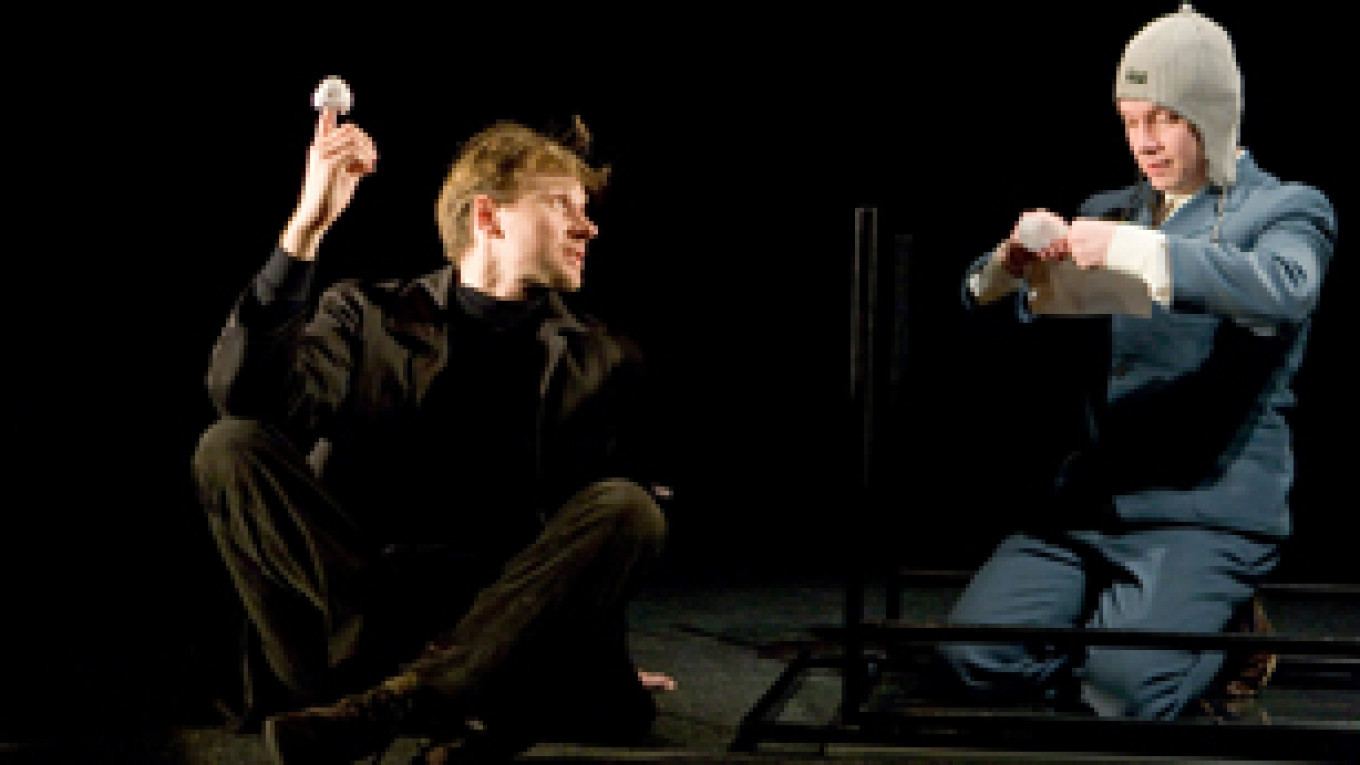I will add this brief preface, however: Despite the criticisms being heaped on this show, I thought the cast in Oleg Gettse's production of McDonagh's mystifying play was incredibly strong. They provided superb performances that really got inside the characters.
But therein lies the danger. This is the very reason the show failed to capture the audience's attention sufficiently.
This is not a problem of Gettse or the Yekaterinburg actors. It is a problem I see whenever more-or-less contemporary British drama is staged in Russia. Harold Pinter, Tom Stoppard, Marc Ravenhill, Sarah Kane &mdash none quite make the transition intact. McDonagh has been huge here in recent years, and with the exception of some nice productions by Sergei Fedotov in Perm and a fine show by Yury Urnov in Vladikavkaz, the majority have been underachievers at best.
The chief reason is irony.
There is no lack of irony in Russia, but it is a completely different animal than that which shapes the British sense of humor. Pardon the generalizations that follow, but, with their stiff upper lips, the Brits are masters at making mincemeat of sentimentality and excessive seriousness. Russians, with their rich, nuanced and deep soulfulness, have developed sentiment and profundity to a level of complexity few nations can hope to attain. Russian irony tends to emerge in pictures of overmatched dreamers taking on, and losing to, the relentless machine of fate.
I recall having a conversation two years ago with Konstantin Raikin, who was then rehearsing McDonagh's "The Beauty Queen of Leenane" and "The Lonesome West" at the Satirikon Theater. Admiring these plays for their dark, twisted humor, Raikin was incontrovertibly dismissive of "The Pillow Man" because, he said, it "went too far."
I can also recall a conversation with Armen Dzhigarkhanyan after we both watched a touring British show of Samuel Beckett's"Not I," a piece famous, in part, because the only performers are a spot-lit mouth and an unseen figure under a drape: "You cannot do that in theater!" said this powerful actor who only recently had performed brilliantly in Beckett's "Krapp's Last Tape." "There is no theater if you don't have human emotions!"
I thought of Raikin and Dzhigarkhanyan as I watched the Yekaterinburg troupe's "Pillowman" production. By leaning on the great and mighty school of Russian theater &mdash Stanislavsky and psychological realism &mdash Gettse and his crew veered dangerously wide of the mark in their interpretation of McDonagh.
The play is about a writer who ultimately claims to have killed six people, three of whom he tortured, while all he really seems to care about is that his 400 stories &mdash 399 of them unpublished &mdash not perish after he is executed. Of course, this tale is not at all what it appears to be. There are signs all over the place that we, the audience, are getting our legs pulled left and right. Not the least of these signs is the raucous, hard-hitting humor that McDonagh keeps coming in waves that alternate with the increasingly horrifying stories of blood, guts and mayhem.
During Act One of the show I attended Sunday night, there was not a single burst of laughter from the audience. Nothing but a few isolated, stifled chuckles (most of them mine). The play's humor &mdash that is, the engine driving this piece forward &mdash was missed entirely. There were, perhaps, two bursts of laughter in Act Two, but by then, opinions had been formed.
Can we blame the audience? You're not supposed to do that in theater. Like the client, the audience, they say, is always right. That's baloney, of course. And I do think the audience was to blame in part. You could feel them being utterly horrified by the horrors and falling deaf to the attempts at humor. This is an audience, after all, steeped in Stanislavsky every bit as much as the performers are.
It is nonetheless the duty of the director and actors to bring the audience around, though.
The reality is that everyone that night &mdash director, actors, spectators &mdash were all working in that deep and cherished Russian territory of commiseration, of sharing in human pain. Meanwhile, the author, through his work, was playing games, as if capriciously tossing darts at balloons and taking delight in watching them pop.
I categorically object to anyone heaping criticism on Gettse and his cast. That is completely missing the point. Viewed on their own terms, this team's production of McDonagh is remarkably powerful and admirably nuanced. The problem is much greater than that: it is the dilemma of two vastly different cultural traditions, two national mindsets, ramming up against one another and crashing down in pieces.
A Message from The Moscow Times:
Dear readers,
We are facing unprecedented challenges. Russia's Prosecutor General's Office has designated The Moscow Times as an "undesirable" organization, criminalizing our work and putting our staff at risk of prosecution. This follows our earlier unjust labeling as a "foreign agent."
These actions are direct attempts to silence independent journalism in Russia. The authorities claim our work "discredits the decisions of the Russian leadership." We see things differently: we strive to provide accurate, unbiased reporting on Russia.
We, the journalists of The Moscow Times, refuse to be silenced. But to continue our work, we need your help.
Your support, no matter how small, makes a world of difference. If you can, please support us monthly starting from just $2. It's quick to set up, and every contribution makes a significant impact.
By supporting The Moscow Times, you're defending open, independent journalism in the face of repression. Thank you for standing with us.
Remind me later.







